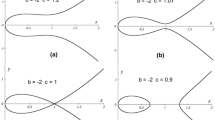
Overview
- Gives a unique survey of different approaches to nonautonomous bifurcation theory
- Examples guide the discussion and comparison of different approaches
- Provides a unique collection of tools from the theory of nonautonomous dynamical systems
Part of the book series: Frontiers in Applied Dynamical Systems: Reviews and Tutorials (FIADS)
Access this book
Tax calculation will be finalised at checkout
Other ways to access
About this book
Similar content being viewed by others
Keywords
Table of contents (7 chapters)
-
Front Matter
-
Nonautonomous Differential Equations
-
Front Matter
-
-
Nonautonomous Difference Equations
-
Front Matter
-
-
Back Matter
Authors and Affiliations
Bibliographic Information
Book Title: Nonautonomous Bifurcation Theory
Book Subtitle: Concepts and Tools
Authors: Vasso Anagnostopoulou, Christian Pötzsche, Martin Rasmussen
Series Title: Frontiers in Applied Dynamical Systems: Reviews and Tutorials
DOI: https://doi.org/10.1007/978-3-031-29842-4
Publisher: Springer Cham
eBook Packages: Mathematics and Statistics, Mathematics and Statistics (R0)
Copyright Information: The Editor(s) (if applicable) and The Author(s), under exclusive license to Springer Nature Switzerland AG 2023
Softcover ISBN: 978-3-031-29841-7Published: 02 June 2023
eBook ISBN: 978-3-031-29842-4Published: 31 May 2023
Series ISSN: 2364-4532
Series E-ISSN: 2364-4931
Edition Number: 1
Number of Pages: X, 156
Number of Illustrations: 1 b/w illustrations
Topics: Dynamical Systems and Ergodic Theory, Vibration, Dynamical Systems, Control, Mathematics, general



